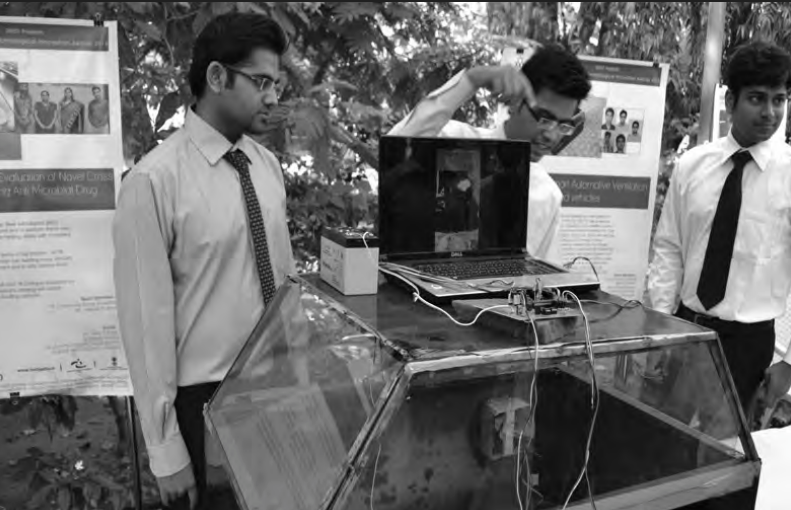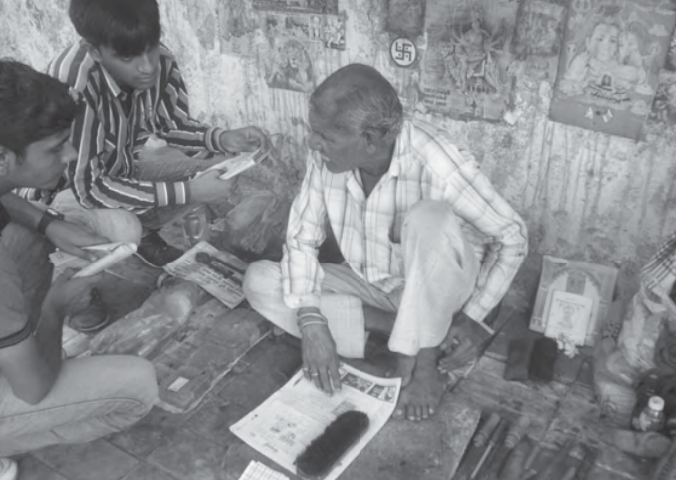Techpedia, an initiative at SRISTI aims at putting the problems of micro, small and medium enterprises, informal sector, grassroots innovators and other social sectors on the agenda of the young technology students across the country. For over last sixty years, India has not utilized much the technological outputs of millions of students.
But no more. Can a knowledge society really afford to ignore the huge talent distributed in thousands of polytechnics, diploma and degree colleges of engineering, pharmacy, medical science, agriculture etc.?
SRISTI is providing a platform for the industry and academic institutions to collaborate, co-create and foster distributed and horizontal innovations. Most of the ideas mentioned here have been implemented and the initial results are shown extremely encouraging.

WHAT IS TECHPEDIA?
Techpedia (www.techpedia.sristi.org) is a portal developed to serve as a repository of students’ technical projects from across sectors. Over the last five years, Techpedia, originally starting with the student volunteers at SVNIT Surat, has pooled more than 200,000 titles and summaries of engineering projects pursued by about 600,000 students from over 700 institutions.
Through a close cooperation with Gujarat Technological University, a unique ecosystem for innovation has developed so that students earn credits for identifying the problem in the summer and earn further academic credits for trying to solve these problems in their final year. The Punjab Technical University (PTU) has made it obligatory for students to upload their final year projects before they can be awarded their degrees.
PTU has also offered 50 fellowships of Rs. 25 000 each per month to students who wish to set up enterprises after their graduation. During the last three years, more than 50 000 students have worked on the problems of more than 9 000 MSME units as a part of their academic work in Gujarat. Through Techpedia, in, SRISTI has also propagated the idea of National Innovation Clubs among various colleges in Karnataka, Punjab, Gujarat, Odisha, to search, spread, and celebrate innovations and sense the unmet needs of society.
The Honourable President of India has advised such clubs to be set up in Central Universities, NITs and other institutions. The “wicked” problems need a special focussed strategy. In 2013, SRISTI organised, with the support of ILO, a summer school to develop prototypes to eliminate child labour and/or increase the income of the parents and reduce the risk of injury or accidents at work. Six prototypes were developed in three weeks.
During the next summer school of 2014 students worked on improving innovations by grassroots innovators such as the Bullet Santi. SRISTI has established National awards for innovative student projects in engineering, pharmacy, science and other applied technologies. The selection of nominations to be awarded as Gandhian Young Technological Innovator, involves hundreds of faculty members in India and abroad, and executives from leading tech companies who review the submissions.
Dr. R A Mashelkar, Chairperson, NIF and the Chair of the Advisory Committee of AASTIIK and SRISTI gave away the GYTI 2012, 2013 and 2014 awards at IIM-Ahmedabad, and the GYTI 2015 award ceremony was held at the Rashtrapati Bhavan (Rashtrapati Bhavan Cultural Centre).
Till date 140 teams have been awarded or appreciated and GYTI Awards. GYTI Awards has not only been a means to award and exhibit innovations but also the innovators get a thorough hand-holding at various stages after the coveted national award. Already 10% of the GYTI winners have attempted start-ups based on their innovations. The award highlights the fact that there is a huge potential of creativity and innovations in young students which is yet to be tapped. They are a critical part of our national innovation system.
Realising the need of the hour and looking at the innovation potential of awardees, Biotechnology Industry Research Assistance Council (BIRAC) has sponsored BIRAC-SRISTI GYTI Award 2015 worth Rs 15 Lakhs each to five selected innovations to enable them to be taken to the next stage.
We hope many more collaborations and policy interventions will create a fostering environment for young innovators in days to come. The GYTI Awards will serve to inspire and stimulate young innovators. Techpedia is helping to build an inclusive ecosystem involving actors across the spectrum of the innovation value chain. Right from building the ecosystem, making pedagogic and other interventions, creating incentives and shaping new policy tools, it has been engaged to ensure that a million young technology students passing out every year play a crucial role in making India innovative.

OBJECTIVES OF THE TECHPEDIA PLATFORM
1 – To promote originality, which in the absence of a database of this kind, will be very difficult to ensure?
2 – To encourage students to take up socially, industrially and ecologically important challenges to meet the unmet needs of society
3 – To encourage collaborative learning
4 – To link academia and industry so that entrepreneurs, particularly from small industries get technological support through final year projects of engineering students
5 – To help find markets for the technologies – developed by the students
6 – To use an open innovation platform for challenge awards and distributed innovation management for generating extremely affordable
LEARN MORE
- Isn’t it nice that most tech innovation competitions in India borrow nominations from among those first scouted and awarded by Techpedia.in at SRISTI? (Anil K.Gupta blog, 19 December 2013)
- An update on Techpedia.in – a SRISTI initiative (Anil K.Gupta blog, 21 December 2011)
- Kho-Kho model of innovation : Techpedia.in (Anil K.Gupta blog, 06 March 2011)
- Techpedia : 2 response to comments (Anil K.Gupta blog, 07 December 2009)
- Discussion techpedia.in : 2. incentives, institutions, and innovations (Anil K.Gupta blog, 06 December 2009)
- Making www.techpedia.in more vibrant platform for linking students and faculty with small scale industry and innovators (Anil K.Gupta blog, 04 December 2009)
- Techpedia builds linkages among students but also with industry, innovators and society at large (Anil K.Gupta blog, 22 November 2009)
- Techpedia.sristi.org how will projects at this portal be upscaled? (Anil K.Gupta blog, 01 July 2009)
- Techpedia.sristi.org – Portal for technology projects (Anil K.Gupta blog, 03 May 2009)
- Techpedia.in (techpedia.sristi.org) : A portal of technology projects by students to link the needs of industry and grassroots innovators with young minds and to promote collaborative research (Anil K.Gupta blog, 11 April 2009)

